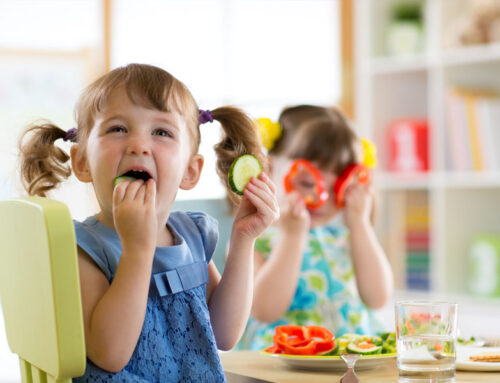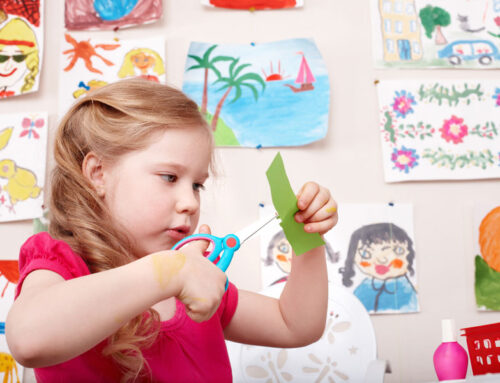Val Robinson Childcare Services Limited places the highest priority on providing a healthy food environment for our children.
Good nutrition in the early years is so important and can positively influence a child’s:
- Concentration
- Physical development
- Learning outcomes
- Behaviour
- Cognitive development
- Long term future health
Encouraging children to eat well and learn about food in the early years not only protects their health when they are young, but also sets the foundations for their future health and well-being (Children’s Trust 2015)
My staff and I have undertaken training on Providing a Healthy Food Environment in Early Years Settings. Following this I have reviewed current practice researched food and drinks and set new guidelines for Snacks and Packed lunches at our Preschools
If your child has any special dietary requirements, please speak to the Preschool Mangers or your Keyworker.
New Guidance for Healthy Snacks and Lunches
Mid- morning Snack-time
-This should consist of 1 portion of Fruit or Vegetables or 1 portion of Dairy
Suggestions are:
| Vegetables | Fruit | Dairy |
| Vegetable sticks, Cucumber/Celery/Pepper/
Carrots |
1 Banana
kiwi 3-10 grapes cut lengthways Strawberries/satsuma/apple/pear |
Yogurt 125gm or 2 mini pots
Cheese |
| 1 slice melon | Cheese and breadsticks/crackers | |
| 2-4 tbs canned fruit in juice | Babybel cheese/ cheese triangles |
Please do not include Raisins, Fruit winders, Fruit Flakes, Cheese snacks with crisps
We will supply a carton 1/3 pink of semi skimmed milk
Packed lunch
This should consist of 1 or 2 portions of starchy food, 1 portion of protein, 1 portion of Vegetables, 1 portion of Fruit, 1 portion of Dairy.
Suggestions are:
| Starchy Food
1 or 2 portions |
Protein
1 portion |
Vegetables
1 portion |
Fruit
1 portion |
Dairy
1 portion |
| ½ to 1 slice wholemeal or white bread
1-3 breadsticks/Crackers |
2 slices chicken/turkey
1 slice beef 1 slice Ham |
Vegetable sticks
Cucumber, celery, peppers, carrots |
Apple
Banana 3-10 grapes cut lengthways ½ to 1 kiwi/plum |
Yogurt 125 gm or 2 mini pots
Custard pot Rice pot Fromage frais |
| Small bagel, roll, pitta bread, wrap | Tuna
Salmon/Mackerel
|
Salad – 2 lettuce leaves with 4 cherry/small tomatoes sliced lengthways | 2-4 tablespoons canned fruit in juice | Cheese cubes
4 tablespoons grated cheese
|
| 2-5 tablespoons Pasta, Rice, Noodles | 1 boiled egg | 100% fruit Smoothie
|
Babybel, cheese triangle |
| Foods high in fats, sugar and salt
These foods are not needed in the diet and so, if included should only be in small amounts and infrequently. Children should avoid filling up with these instead of eating more nutritious foods from other food groups. · If you include crisps we recommend that you go for varieties with less fat and salt. (The recommendation is that crisps should only be included in packed lunches once a week) · A small plain cake or biscuit can be included but we recommend that these are not chocolate covered or iced varieties.
|
Please note:
- Please be aware of portion sizes. A child’s stomach is much smaller than an adult and as a guide one portion should fit into a child’s hand. For further guidance please speak to a member of staff.
What is not allowed?
- No sweets/chocolate are allowed. (These include split yogurt pots with sweets.)
- Do not send in Hot or Warm food as bacteria grows on warm food. Pre-cooked food must be cooled in a refrigerator at home before adding it to your child’s lunch box.
Nut allergies – To safeguard children with Nut allergies please do not include Nuts, Nutella or chocolate spread, Peanut butter or nut products in lunches.
All lunch boxes must include a Cool bloc as we do not have refrigeration facilities for packed lunches.
Drinks: We will supply all drinks, please do not send in drinks.
Milk and Water will be offered throughout the day. If you do not wish your child to drink tap water please provide plain bottled water. We do not allow flavoured water as it contains artificial sweetener and preservatives.
At lunchtime children will have a choice of water or a pure fruit juice (not from concentrate) with the lunch time meal.
| *Sugary drinks should be limited to mealtimes rather than giving them as snacks in between meals. Diluting squash well with water will make it less sugary. Fruit juice contains valuable vitamins and minerals. Government advice is to limit fruit juice and smoothies to a total of 150ml a day (1portion) .
150ml of unsweetened, fresh 100% fruit juice or smoothie can count as 1 of your 5 daily portions of fruit and vegetables. (NHS.UK) |







